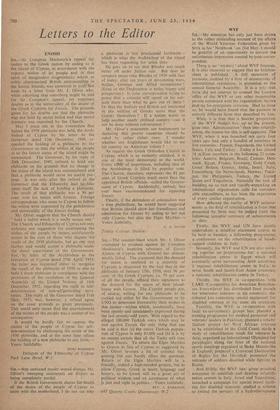If the British Government shares his doubt of the desire
of the people of Cyprus to unite with the motherland, I do not see why a plebiscite is not proclaimed forthwith— which is what the Archbishop of the island has been requesting for some time.
He goes on to say that Rhodes was much better off under Italian rule. But does he compare peace-tirhe Rhodes of 1939 with that of today, after ten years of devastating wars, Italian, German and Allied occupations ? (Even so the Dodecanese is today happy and prosperous.) Is your correspondent trying to prove that a colonist will spend on his sub- jects more than what he gets out of them '? Or that the Italians and British are interested in the welfare of Greeks more than the Greeks themselves ? If a nation wants to help another needy civilised country—can it not be done without colonisation ?
Mr. Oliver's statements are tantamount to declaring that poorer countries should be ruled by rather richer . ones. I wonder whether any Englishman would like to see his country an American colony ?
As regards the Greek Orthodox Church in Cyprus, which is so violently attacked, it is one of the most democratic in the world. Every all& of importance, including that of the Archbishop, is filled by popular vote. The Church, therefore, represents the 81 per cent. of Greek Cypriots much more than the appointed British officials—called the Govern- ment of Cyprus. Incidentally, nobody has ever been excommunicated for opposing Enosis.
Finally, if the defendant of colonialism was a true philhellene, he would have suggested that Britain should show her friendliness and admiration for Greece by ceding to her not only Cyprus. but also the Elgin Marbles.— Yours faithfully, C. A. DAVID Trinity College, Dublin


































 Previous page
Previous page